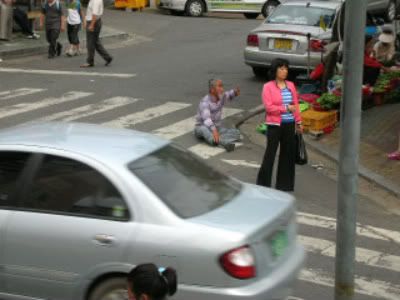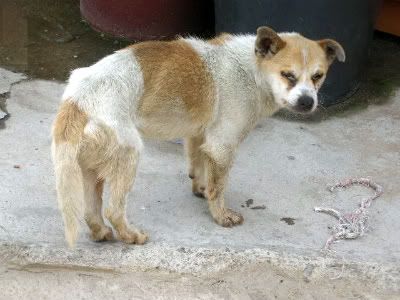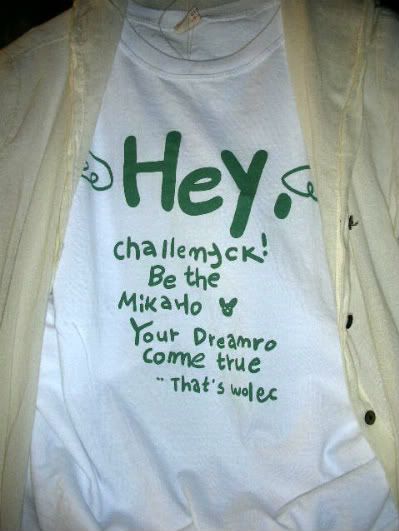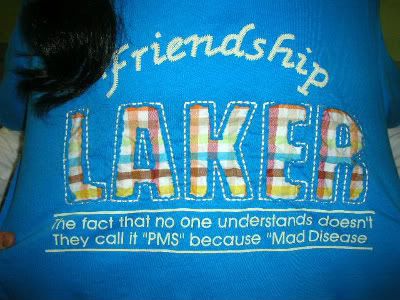Recently, a ban on the import of American beef was lifted. The ban on U.S. beef had been in effect since 2003 over concerns of mad cow disease. Now that the ban has been lifted, the import of beef on the bone from cattle under 30-months-old will be allowed.
I wouldn't really care about this, except if it means that I'd be able to buy me some cheaper meat - that's a-ok by me. Korean beef is
expensive, and even though I don't eat it very often, it's never really stood out as being especially delicious. On the other hand, my brother - a steak aficionado - who has eaten at many of the primo steakhouses in North America, declared the Kobe beef he sampled in Japan to be the best he's ever tasted. The Japanese knows them some steak. The last time I ate steak was a few weeks ago at some shabu-shabu buffet. I tried a bite and then tucked the two pieces into a bag and fed them to my outside dogs. Blech.
So, as far as I'm concerned, I don't really care one way or another about imported U.S. cow. Do you know how many Koreans care about it?
All of them.Well, maybe not all. The little babies don't care. But otherwise the rest of the population is fired UP! I wasn't even aware of the problem before my former co-worker Joy got on MSN messenger with me last weekend, bitter and outraged. While she typed out her anger, I googled "mad vow" and "Korea" and got the gist of what she wsa on about. There had been a
TV show that aired, From the linked article,
"PD Diary," an in-depth current affairs program on MBC, reported that 94 percent of Koreans have genes that make them more susceptible than Americans or Britons to Creutzfeldt-Jakob Disease (CJD), which is the human variant of mad cow disease. The report claimed that this physical trait makes Koreans two to three times more likely than Americans or Britons to contract the disease.
Many elements of the American beef horror stories aired on "PD Diary" were exaggerated. Some 100 million cattle are bred in the U.S., but so far only three have been discovered to have been infected with mad cow disease, and one of those had been imported from Canada. The other two were born before 1997, when the U.S. government banned cattle feed containing meat and bones, found to be the source of mad cow disease. The rate of mad cow disease among U.S. cattle is far lower than in Japan, where around 20 out of a million cattle were discovered to have been infected
About 10,000 people gathered for a
candlelight vigil in Seoul recently.
Hysteria.
And the thing is, it seems like most Koreans could recognize that they're angry. However, they're having some trouble figuring out who exactly they're angry at. Just like
Dokdo unlaced everyone a couple years ago, the issue has quckly trickled down to my students. This past week my middle school students have been blurting out "America crazy cow!" in my classes. I think they want to talk about it, get all pissed off and loud about it, but their level of English prevents them from taking me to task. As if it's my fault.
Which it might be. Who knows?
One of my students is celebrating his birthday today and on Friday I asked if he was having a party. He told me he was, and when I asked where he explained it was going to be at Lotteria (kind of like the Korean version of McDonalds) but because of "crazy cow" they weren't going there. I'm just about positive Lotteria doesn't use U.S. beef. (Frankly, if you've ever had a burger there you'd know it's more likely comprised of sawdust and mealworms.) However, because there's "beef" there, it must be boycotted. Another student told me a list of other products that must be avoided: candy, jelly,...anything with gelatin in it. If you eat it, you will die.
Anyone I've asked about this gets pissed off. My boss, who I've always thought to be fairly rational (kind of sort of) told me that because Koreans prepare beef dishes differently, (like, they make soup and drink the broth!) they're more likely to contract Creutzfeldt-Jakob disease (the human version of mad cow) and they will die.
There's quite a hate fest that Koreans have towards some other countries. It's a complicated thing that comes partly from history, but is perpetually passed down from one generation to the next. My middle school students have no reason to be pissed at America, but they are. If I were them, I'd be more pissed at my parents for making me go to five different academies to study after my school day ended, so I get home at eleven o'clock, study for a couple hours before bed and then get up at seven to do it all over again.
Childhood, schmildhood.
The top three countries hated by Korea are Japan, America, and China, and it seems like many Koreans will gather up any cause to display how much they distrust and despise these other nations. And they'll do it despite being fed fallacies and not needing to know the facts.
Facts, schmacts.
What I'd like to see is Koreans get fired up about some cause that benefits Korea. Nevermind the outside world. Can you imagine the goodness that could come if parents would pass on some enthusiasm and passion about not littering? Recycling? Animal welfare? Women's rights?
Maybe someday.









